VIEWPOINTS – Summertime in London: A recap of a deep dive in theater-going
- By drediman
- July 9, 2024
- No Comments
This past week, I had the great pleasure of immersing myself in London’s summertime theater and broader performing arts offerings. Based on my weeklong excursion — and in contrast to New York’s more dormant slate of post awards season openings — the performing arts scene across the pond has shown minimal signs of slowing down during the dog days of summer. As always, read on for my thoughts on my theater-going adventures across the pond.
Lavish family entertainments dominate the market
This summer, a pair of hugely anticipated family-friendly productions have been dominating the live entertainment market. They are the lavish stage adaptation of Hayao Miyazaki’s Studio Ghibli masterpiece Spirited Away at the London Coliseum and the retooled revival of Andrew Lloyd Webber’s Starlight Express at Troubadour Wembley Park.
First seen in Japan, the stage version of Spirited Away (HIGHLY RECOMMENDED) has arrived in London with a great deal of fanfare — made even more palpable coming on the heels of the recent RSC production of My Neighbor Totoro, another screen-to-stage adaptation of a similarly beloved Studio Ghibli film. Even if the production at the Coliseum doesn’t possess quite the same intoxicating theatrical imagination and ingenuity as Phelim McDermott’s Olivier-winning staging of Totoro, John Caird’s directorial work nonetheless does a sensational job of faithfully translating the Oscar-winning film’s eventful plot and distinctive visual poetry for the stage. Indeed, no expenses were spared in this painstaking pursuit to replicate the film scene-by-scene, which involves the skillfully deployment of a large team of committed actors, puppeteers, musicians, and dancers. The result is a dazzling spectacle that stays staunchly true to the film’s heart and seamless cinematic storytelling. In an inspired choice, the decision was made to retain the original Japanese dialogue (with projected English titles), which brings its own vigor and passionate cadence to Miyazaki’s modern classic.

Then over at the Troubadour Wembley Park — accessible via just a short ride on the tube from Central London on either the Metropolitan or Jubilee Lines — there’s the updated revival of Starlight Express (RECOMMENDED), Andrew Lloyd Webber and Richard Stilgoe’s notoriously overblown mega-musical on roller skates. Like Spirited Away, this “best of” production has spared no expense in extravagantly staging what is essentially a souped retelling of the classic children’s story of the little steam engine that could. Indeed, director Luke Sheppard and his crack design team have created an all-encompassing environment — a state-of-the-art immersive playground featuring train tracks that surround much of the audience — that remains true to the musical’s original sense of spectacle and kineticism. Thankfully, the creative team has retooled the underlying material, bringing to the fore a touching mother-child relationship — thereby injecting the show much needed emotion heft — and progressively tweaking casting choices with respect to gender and sexual orientation (not necessarily an issue given that the characters are literally trains!). The game, young cast acquit themselves admirably to the the show’s risky high octane physicality and simple sentiments (which have more in common with Lloyd Webber’s Joseph and the Amazing Technicolor Dreamcoat than any of his other shows).
The requisite Shakespeare — the good, the bad, and the ugly
No theater trip to London would be complete without a visit or two to the theater to take in works by William Shakespeare. This time around, I managed to squeeze in two of them — the solidly sold out Tom Holland-led Romeo and Juliet in the West End and Shakespeare’s Globe’s sparkling revival of Much Ado About Nothing.

Arguably the hottest ticket in town, Jamie Lloyd’s current revival of Romeo and Juliet (SOMEWHAT RECOMMENDED) at the Duke of York’s Theatre is also unfortunately one of the most disappointing. Led by film star Tom Holland (of the Spider-Man films), the production marks the Hollywood A-lister’s return to the London stage since his appearance in the title role of the musical Billy Elliot as a child actor. Sadly, he makes for an oddly ineffectual Romeo — all fury but ultimately little impact. Thankfully, the ladies fare much better, starting with Francesca Amewudah-Rivers’ determined, fully-realized Juliet, who more than ever registers as the play’s engine. A relative unknown, Amewudah-Rivers gives a driven, self-possessed portrayal that captivated me with its confidence and magnetism. She’s a real find. Also quite compelling as Juliet’s Nurse is Freema Agyeman, whose “big sister” interpretation of the role brings much needed sensuality to an oddly passionless staging. One of today’s hottest working directors, Lloyd here reverts — lazily — to stage techniques from his recent austere, multimedia productions, namely his Broadway-bound Sunset Boulevard. Although he’s known for bringing laser sharp focus to the text, this liberally truncated Romeo and Juliet (for example, both Lady Capulet and Lady Montague are completely excised from the script) nevertheless feels flat and needlessly drawn out.
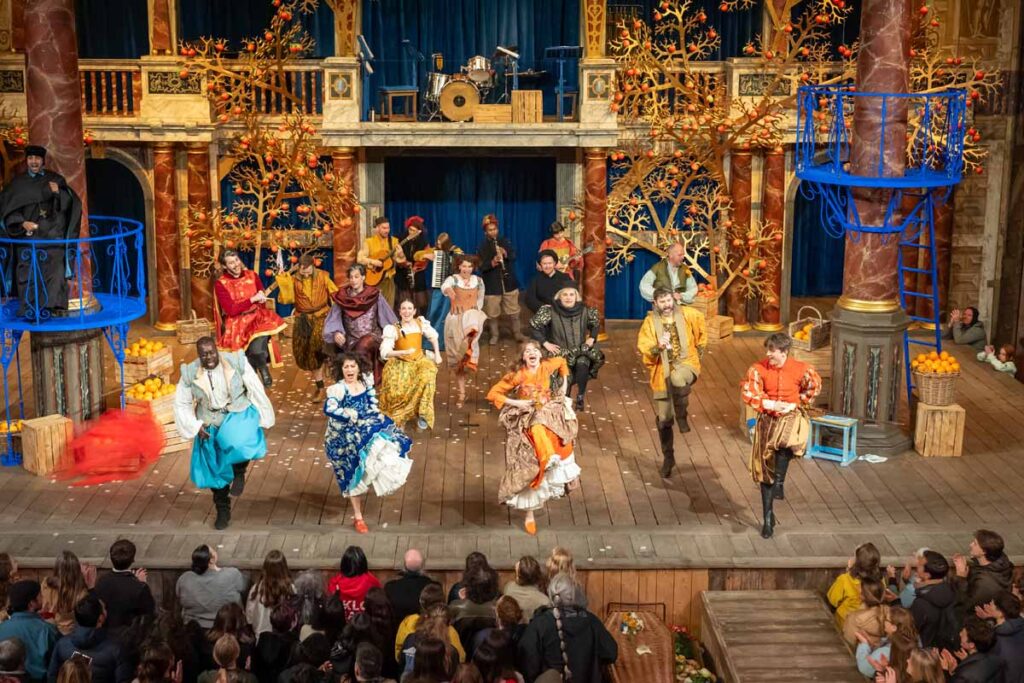
Much more successful, on the other hand, is Shakespeare’s Globe’s spirited, largely traditional staging of Much Ado About Nothing (RECOMMENDED) — in my opinion, one of the Bard’s strongest and most well-rounded comedies. Happily, the production is played with an exuberance and appealing broadness that feels natural and just right for the play. Indeed, while the actors beckon audiences to actively engage in their performances, they also feel fully realized and comfortably ensconced in the play’s world. This is particularly true of arguably the play’s two most famous characters — the sweet and sassy romantic coupling of Beatrice and Benedick — who are in this production played with comic vigor and irrepressible wit by Amalia Vitale and Ekow Quartey, respectively. Also noteworthy is John Lightbody’s uncommonly robust Leonato, a chacterization notable for its tongue-in-cheek self awareness. I commend both director Sean Holmes’ quickly-paced, sun-drenched staging and her fine cast for handling the play’s darker streaks with care; they expertly balance the sombering elements with the play’s overarching levity and sunny disposition. The end result is a wonderfully satisfying, crowd-pleasing night of al fresco theater.
Thoughtful musical revivals that build upon the originals
So far, these summer months have also produced a couple of immensely thoughtful West End musical revivals for theater fans to chew on. Notably, these include Tom Kitt and Brian Yorkey’s Pulitzer Prize-winning Next to Normal at the Wyndham’s Theatre and Cole Porter’s classic musical Kiss Me, Kate at the Barbican Theatre (note that this summer also has in store an anticipated revival of Hello, Dolly!, starring the great Imelda Staunton, at the London Palladium).

When Next to Normal opened on Broadway in 2008, it stunned theatergoers with its candid and unfiltered examination of mental illness. The musical has now returned in an intelligently reconceived London revival (HIGHLY RECOMMENDED) directed by Michael Longhurst. First seen in the extremely intimate Donmar Warehouse in Covent Garden, the production now finds itself at the Wyndham’s Theatre in the West End, where it remains as potent and hard-hitting as it was when the musical first premiered — but in subtly different ways. Swapping original director Michael Grief’s boldly suggestive approach for a more literal depiction of a family crumbling under the weight of one woman’s extreme bipolar condition, the piece now exudes a kind of specificity that I hadn’t seen before (our collective understanding of mental health issues has advanced substantially since the musical first came onto the scene). Leading the way is the gorgeously-voices Caissie Levy — less obviously histrionic than Alice Ripley in her Tony-winning turn — who gives the mentally unstable character of Diana a painfully realistic and reactive portrayal. Following her example, the rest of the cast appear to have also started from scratch, building their troubled respective characters from the ground up. As a result, the revival feels alive and emotionally fresh, bringing new layers and nuances to a show that I thought I knew well. The revival also sounds amazing, particularly given the quality of the playing by the terrific onstage band and the cast’s superb vocal (Levy and Jack Wolfe’s thrilling renditions of “I Miss the Mountain” and “I’m Alive”, respectively, more than rival Ripley and Aaron Tveit’s original versions).
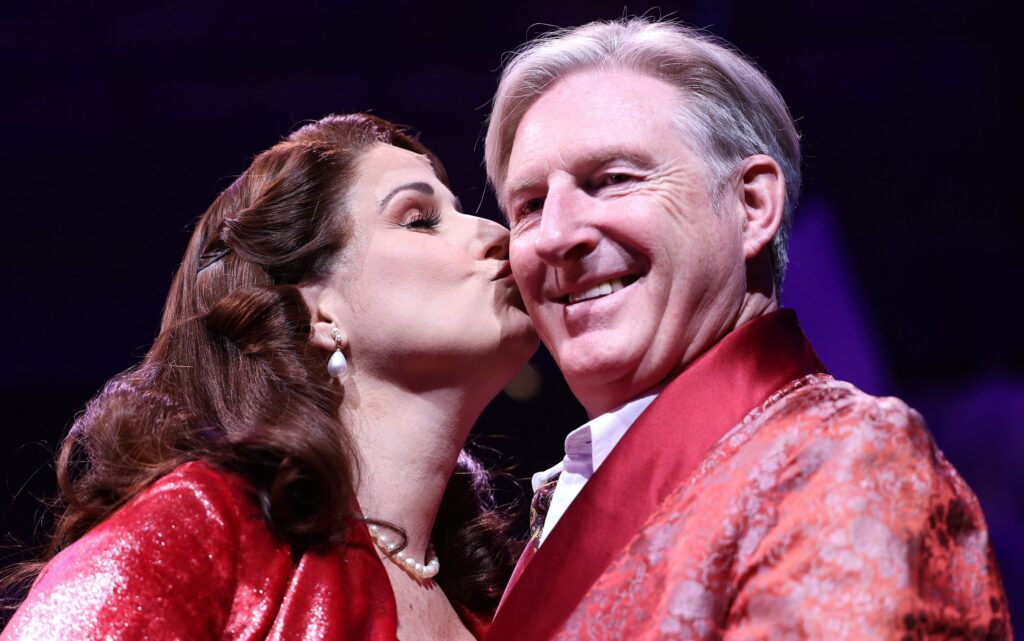
Then over at the brutalist Barbican Centre, you’ll find the handsome new revival of Kiss Me, Kate (RECOMMENDED), Cole Porter’s 1948 “let’s put on a show” musical based on Shakespeare’s The Taming of the Shrew. Although not quite the overt recalibration that the aforementioned revival of Next to Normal is, Bartlett Sher’s well-appointed production is still laced with many small touches that smartly re-evaluate each moment of the show. That the musical fully retains its “Golden Age” veneer is a testament to the subtlety of Sher’s efforts to thoughtfully incorporate broader social consciousness (e.g., addressing the work’s inherent misogynistic bent) — especially noticeable in the additional dialogue and the details embedded in the show’s scene transitions — to Porter’s sturdy and highly entertaining late career hit. In terms of performances, Tony-winner Stephanie J. Block headlines with a sterling performance that’s as classy as it is sassy. In Lilly/Kate, she’s found a role worthy of her considerable talents at this stage of her successful career, and it’s an utter delight to see her sink teeth into it. If the rest of the cast doesn’t quite consistently hit the same musical theater heights as Block does, so be it. Watching a classic musical done on this scale and with this kind of care is an experience worth relishing.
Acclaimed productions return as bona fide classics
During my trip, I also had the chance to catch the remount of two storied productions — Duncan Macmillan’s People, Places & Things at the Trafalgar Theatre and Simon McBurney’s Mnemonic at the National Theatre. Without a doubt, both works have returned to London’s stages this summer as bona fide contemporary classics.
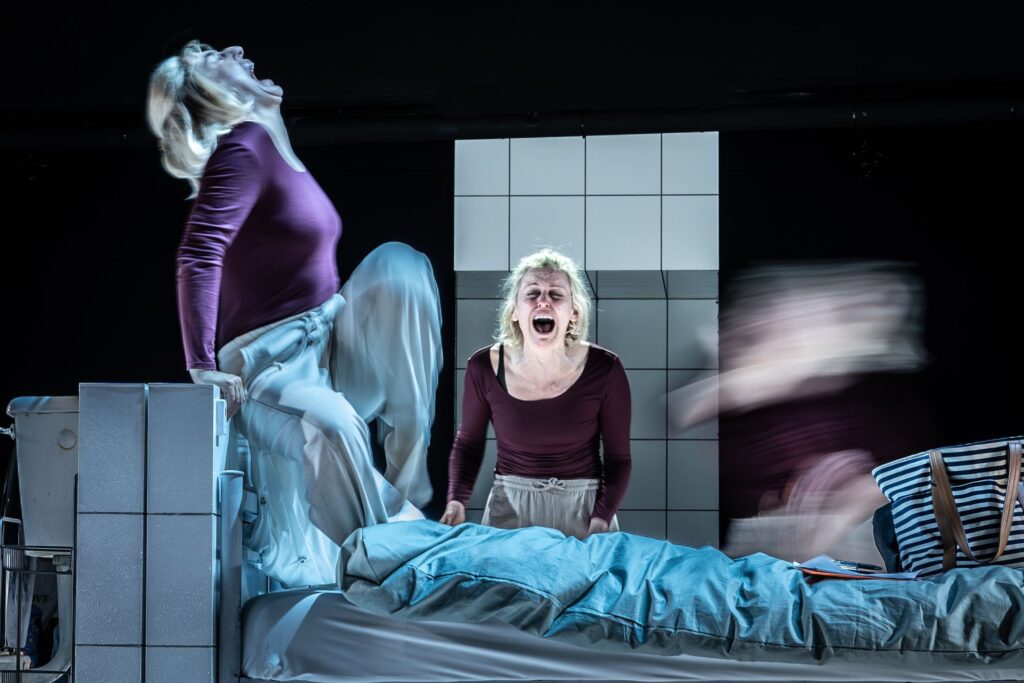
First up is Macmillan’s People, Places & Things (HIGHLY RECOMMENDED), which has come back to London multiple times since it’s premiere a decade ago at the National Theatre. Although last week’s viewing in the West End was my third time seeing Jeremy Herrin’s assaultive production and Denise Gough’s performance as a recovering alcohol and drug addict, I’m happy to report that the piece remains as shocking and gut-punching as my first run in with Macmillan’s play. A study on the trauma of addiction recovery, the work is spiked with plenty of jarring surprises and unexpected layers that still leaves me reeling. Central to the whole experience is Gough’s breathtaking performance as a self-destructive actress. While difficult to watch, you simply can’t take yours eyes off of her combustible portrayal. In fact, I wouldn’t be surprised if it goes down in history as one of the benchmark performances of the era. Herrin’s fun house staging — now effectively reconfigured to fit within the dimensions of a proscenium theater — seems not only to have lost none of its visceral impact, but somehow has only gotten more aggressive over the years. I wouldn’t be surprised if this powerful production is being primed for a Broadway transfer.
Last week also saw the opening of McBurney’s celebrated and much buzzed about Mnemonic (RECOMMENDED) at the National’s Olivier Theatre, marking the landmark production’s first London mounting since its premiere 25 years ago. Since then, McBurney has become a highly recognized auteur of global theater, on par with the likes of Ivo van Hove and Thomas Ostermeier. Indeed, he’s even been tapped by the Metropolitan Opera and English National Opera to stage their new production of Mozart’s The Magic Flute. A co-production with McBurney’s own theater company Complicité, the refreshed version of Mnemonic (which now stars poker-faced Khalid Abdalla in the role originated by McBurney) largely stays within the blueprint of its seductive original staging. Admittedly, the show may not be to everyone’s taste — it’s a labyrinthine, slow-burning affair that may try the patience of some theatergoers. But as a sort of “thinking man’s theater”, I’d be hard pressed to recommend a more stimulating endeavor than engaging in and unraveling the work’s alluring mysteries. In drawing connections between the show’s disparate threads, McBurney tasks viewers to take leaps into the unknown, in the process aligning notions of memory, one’s origins, and imagination (no further spoilers here).
Beyond traditional theatrical storytelling — dabbling in dance and immersive theater
Beyond world class theater, London is also home to exceptional dance, music, and immersive experiences. Indeed, in addition to the memorable aforementioned performances, I also ventured out to take in some dance (Carlos Acosta’s Carmen at Sadler’s Wells) and immersive theater (Punchdrunk’s Viola’s Room).
Even more so than New York, London is arguably the world’s capital for immersive theatrical experiences, and no one company epitomizes this niche form of live entertainment more definitely than Punchdrunk, a collective which over the years has brought us some the most beguiling, meticulously produced examples of the genre (in the Big Apple, its legendary, long-running production of Sleep No More has left an indelible mark on this emerging art form). Punchdrunk’s latest — Viola’s Room (HIGHLY RECOMMENDED) — represents the company once again redefining and refining its lens, both in terms of expressionistic aesthetic and psychooogically-astute storytelling (beyond Sleep No More, I was thoroughly engrossed with subsequent projects like The Drowned Man and The Burnt City, both of which were mounted in epic manner in London). Unlike its sprawling open world creations, Viola’s Room is cast-less and focused — a linear hourlong journey which embarks in groups of only six at a time. What starts off as a traditional fairytale about the adventures of a sensitive girl quickly spirals into a knotty existential dive into the anxieties of living (again, no spoilers here). Throughout, the attention to detail is astonishing, which is the company’s trademark. You’ll also have to suspend day-to-day logic and rely on one’s God-given senses — particularly sight and touch — to navigate and make sense out of our heroine’s increasingly splintered reality. Contributing to the atmosphere is the show’s 1990s emo soundtrack, which digs its claws into the participants’ sub-conscience well before having to officially set out on their way.
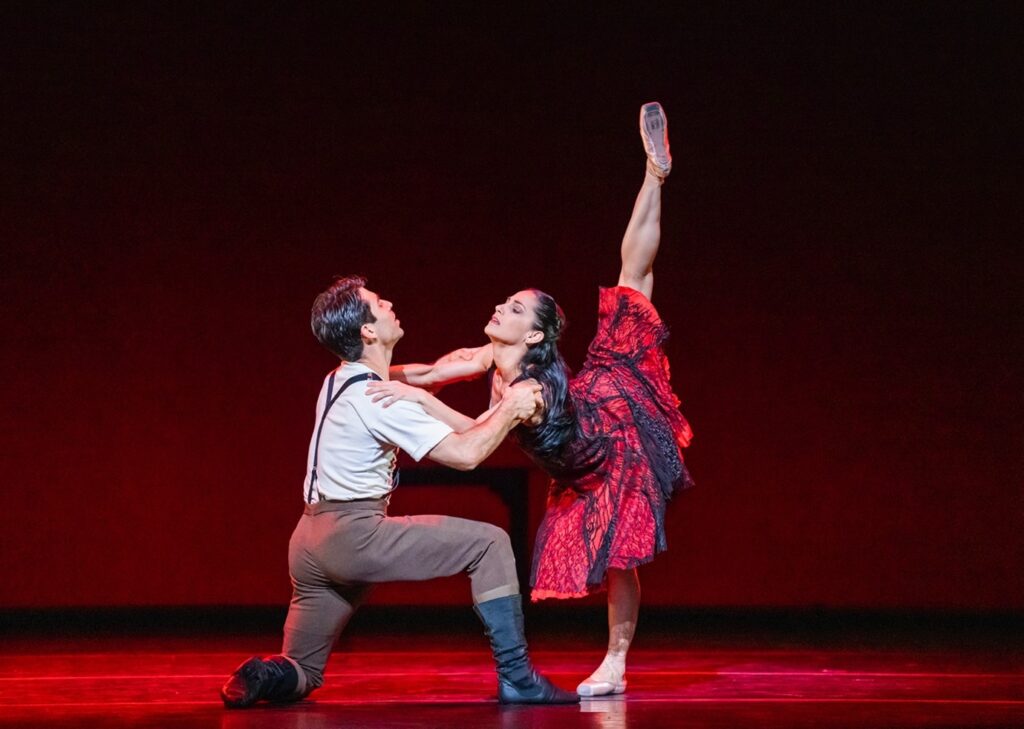
Finally there was Carlos Acosta’s full length dance adaptation of Bizet’s Carmen (SOMEWHAT RECOMMEDED), which the former Royal Ballet superstar and his dance company Acosta Danza — as well as members of the Royal Birmingham Ballet — unveiled last week during its sold out weeklong run at Sadler’s Wells (the production is an expansion of a one act version Acosta created for the Royal Ballet in 2015). Although there were aspects to commend — the stylish design, some of the more intimate MacMillan-inspired pas de deux — the overall endeavor unfortunately failed to hang together as a cohesive stylistic whole and often the storytelling came across as either muddled or ill-conceived. Particularly disappointing were the generic ensemble set pieces (largely derivative of Ohad Naharin’s iconic Minus 16), which felt tacked on rather essential to the storytelling. Given the passion coursing through Bizet’s score, these should have popped. For the most part, the principal performances were technically admirable, but mostly they coasted when they should have sizzled (Enrique Corrales’s performance as Escamillo was the only one that raised the temperature). Acosta’s brief appearances as the Bull of fate/destiny — the headress he dons is everything — were highlights, but these were few and far between. Indeed, his regal magnetism was missed throughout much of his production.

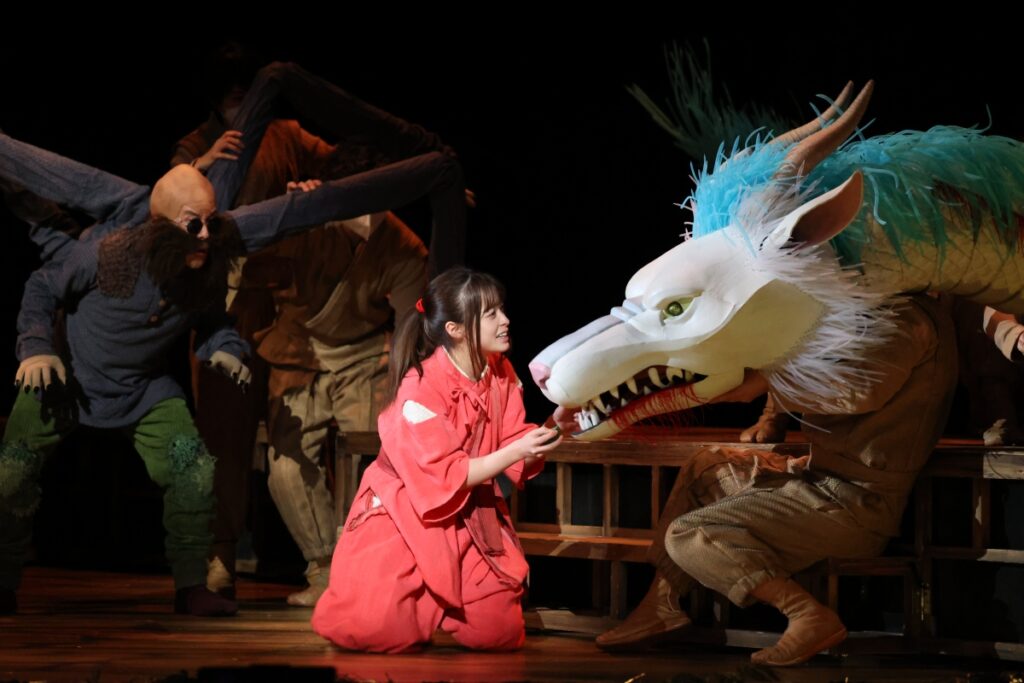
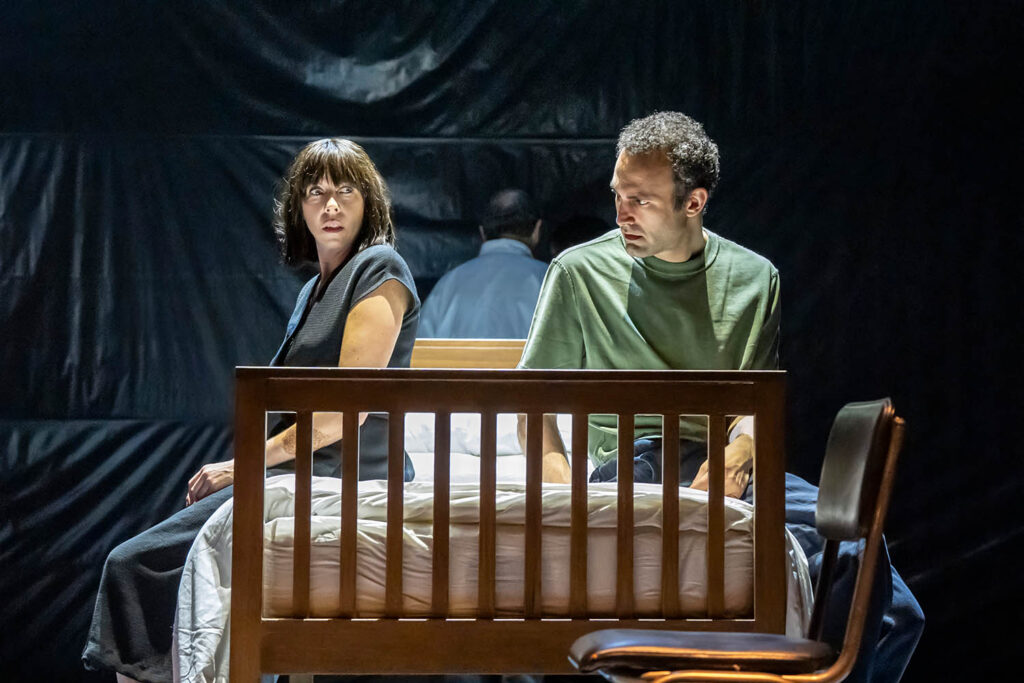
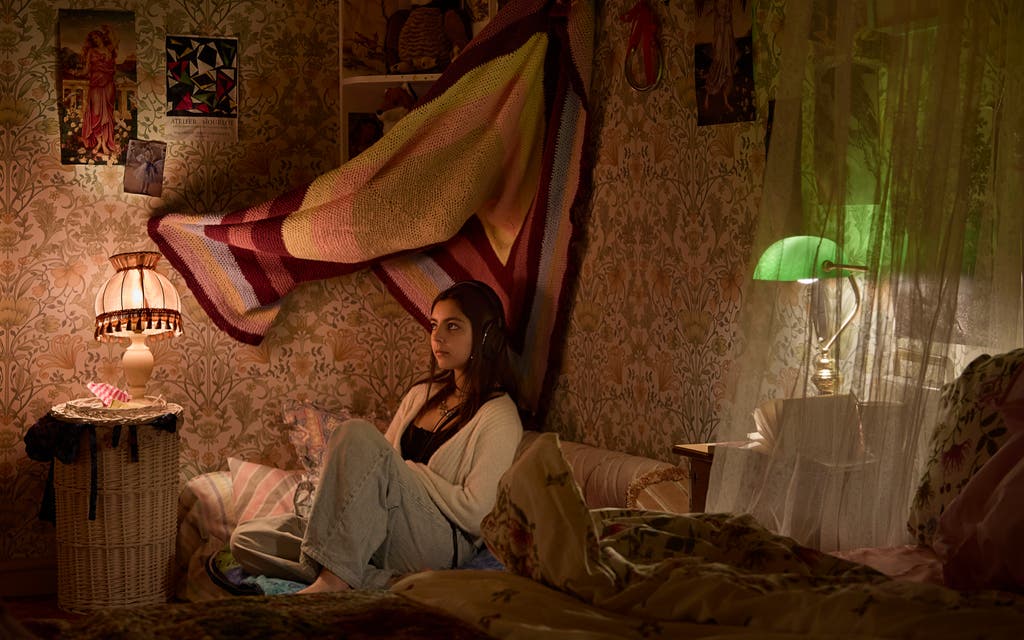
 Copyright © 2025
Copyright © 2025
Leave a Reply